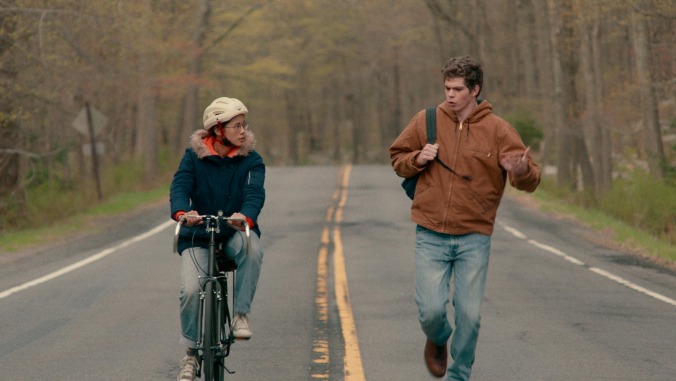Netflix takes another shot at Cyrano de Bergerac with queer love triangle The Half Of It


“This is not a love story,” introverted high schooler Ellie Chu (Leah Lewis) warns us in her opening narration. “Or not one where anyone gets what they want.” That ominous caveat adds a little more tension than there might otherwise be to a Netflix coming-of-age rom-com that updates the Cyrano de Bergerac formula for gen Z. In place of Cyrano’s nasal insecurity, Ellie’s anxiety stems from her sexuality. She’s gay in a small, religious Pacific Northwest town where that isn’t exactly the norm. So Ellie stays in the closet and tries to disappear into the background, at least when she’s not writing her classmates’ papers at $20 a pop. Enter second-string tight end Paul Munsky (Daniel Diemer), a sweet, plainspoken meathead who hires Ellie to write a love letter to class beauty Aster Flores (Alexxis Lemire). The only problem is Aster is Ellie’s secret crush as well.
While Netflix’s previous Cyrano riff, Sierra Burgess Is A Loser, emphasized the creepiness of the story but had none of its heart, The Half Of It comes far closer to capturing the poignancy of Edmond Rostand’s original 19th-century play. As the correspondence between “Paul” and Aster unfolds over letters, texts, and even a little bit of graffiti, Ellie discovers to her delight and dismay that she and Aster have just about everything in common—from their taste in New German Cinema to their existential musings on art. While the real Paul struggles to keep up the ruse in person, he and Ellie develop a close friendship of their own, leading to a complicated love triangle with legs that are platonic, romantic, and sometimes a confused mixture of the two.
Writer-director Alice Wu took inspiration from her own best friendship with a straight guy when she was first coming out of the closet, and Ellie and Paul emerge as the film’s most compelling pair (and Diemer as Wu’s best acting find). His uncomplicated worldview provides an endearing counterbalance to her internalized anxieties. Yet the Cyrano-style wooing shenanigans too often pull focus from their dynamic, rather than enhancing it. The downside of making teen characters this smart and worldly is that the plot contrivances become harder to accept—particularly when they involve elaborate texting schemes and mandatory talent shows.
The Half Of It is full of quirky subplots that don’t always cohere, including through-lines about everything from religion to songwriting to sausage making. This is Wu’s first new film since her breakthrough 2005 Chinese-American lesbian dramedy, Saving Face, and The Half Of It feels overstuffed with 15 years worth of disparate ideas. That means successful elements—like Ellie’s sweet relationship with her taciturn Chinese immigrant father (Collin Chou)—wind up sitting inelegantly alongside less successful ones, like a tonally confused subplot about Aster’s pastor father expecting her to get married right out of high school. (Despite repeated attempts to give her some depth, Aster never quite rises above being an idealized object of affection.)
Still, there’s an earnest emotional maturity that carries the film along as it builds to an ending that’s cathartic without being simplistic. Although The Half Of It mostly sticks to what’s swiftly becoming the Netflix teen rom-com house style (moody amber lighting, Wes Anderson-inspired framing, and nostalgia for John Hughes’ oeuvre), Wu creates several compellingly original images as well. She opens the film with a gorgeous animated sequence explaining the Ancient Greek myth of conjoined soulmates torn apart by jealous gods, and then echoes that concept by repeatedly framing her actors against reflective surfaces. The Half Of It ultimately argues our “other halves” don’t necessarily have to be our romantic partners—they can be our friends, our families, or even just ourselves. As teen rom-com messages go, that’s a welcome one.